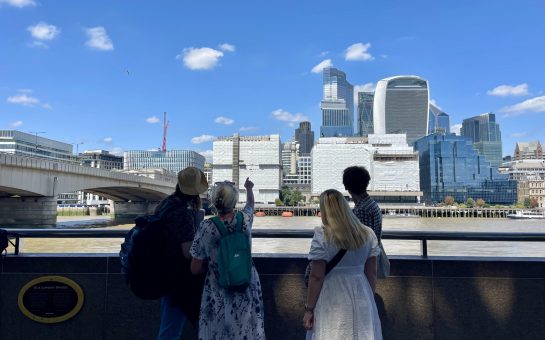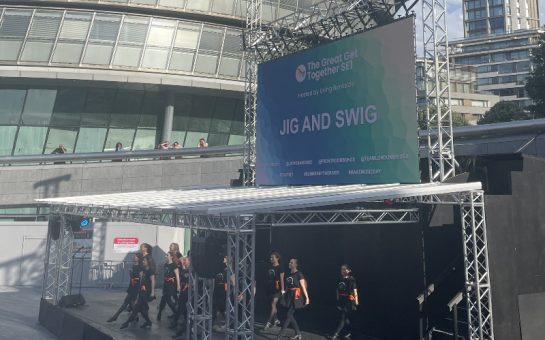Lambeth Council is to go full steam ahead with their regeneration scheme and demolition of Truslove House on the Central Hill Estate, despite growing protest from residents.
Truslove House was used as temporary housing for Lambeth Council, but has now been emptied before it is replaced with 31 new homes.
Estate regeneration has been controversial since it was announced in 2017 due to concerns that regeneration would result in a net loss of social housing on the estate, something that the council refute.
Homes for Lambeth, a company owned by Lambeth council is heading up the scheme that plans to demolish and regenerate seven estates across the borough.
Protest group, Save Central Hill, launched a bid to get the estate listed with Historic England but the bid was recently refused.
Whilst demolition of the building has been approved, residents are still waiting for a full estate masterplan.
Cliff has lived on the estate since 1973 and claimed that regeneration is both dividing and polarising the community, arguing the scheme contributes to social cleansing and killing off communities.
He said: “They’ve left the estate to get to a place where they can argue it’s in disrepair so that they can pack as many people as possible into a small area for some profit. The idea that there’s going to be more social housing is complete propaganda.”
He added that around three years ago he conducted his own survey on the estate and found that about 80% of the people were opposed to demolition – but claimed the council refused to listen as it wasn’t a legal survey.
A Lambeth Council spokesperson pointed out an independent survey held in 2017 found the proposal to rebuild the estate was backed by 55% of council tenants and across all residents, the proposal was backed by 49% in favour to 38% against with leaseholders against the proposal by 51% to 31% in favour.
For critics, regeneration is just another word for gentrification, some even going so far as to describe it as social cleansing.
Research from the Runnymede Trust provided evidence that regeneration across the city comes at the expense of the communities who live there, with people often being forced to move when an area becomes ‘up-market’ and prices are pushed up as a result.
Sabine lives on the estate with her two children and is part of the Save Central Hill campaign.
She said: “The whole approach is just a reckless consumerist view of housing. You can’t demolish something and replace it with something that is not accessible to anyone.
“A lot of people think this doesn’t affect them but it does because who can afford £600,000+ for a two bedroom flat. So who is this for? It’s not for people who want to buy, it’s not for private renters and it’s not for the homeless.
“The council claims regenerating Truslove is to provide for housing for the homeless but they’re not a priority in their plans, these people would have to come back as fully paid tenants.
“Nobody is asking us what we want. We don’t want 60% high end housing.”
Estate regeneration often means it takes years to empty the estate prior to demolition and rebuilding, meaning large numbers of homes are empty for years.
Chris Bailey from Action on Empty Homes, a charity campaigning for empty homes to be brought into use said councils need to take a balanced approach when it comes to regeneration arguing that sometimes regeneration is necessary in most cases, a retrofitting approach is better.
He said: “You’ve got to ask yourself what the rationale is for councils to undertake huge regeneration schemes which reduce the amount of social housing.
“At the moment, every year, we end up with less social housing than we start with.
“Last year we only built about 6,000 truly social homes across the country, and over 20,000 were either sold off or demolished.
“If you knock down a council estate and build towers of so-called luxury housing where largely proportions are outside the reach of anybody on the average income in that borough then you’re not making the situation better, you’re actually making it worse because you’re just going to push up prices, ideally you want to preserve the communities rather than create ghettos of wealth and poverty.
“I don’t think there’s an argument for regeneration on somewhere like Central Hill. That’s pretty much an award-winning estate in terms of the design, a good living environment and a mix of private and green space.”
A Lambeth Council spokesperson responded that every council tenant will be able to move to a brand-new home at council level rent on their estate, and that more council level rent homes would be created as a result of the regeneration.
Government figures published in April show that there were 95,370 homeless households in temporary accommodation at the end of December, a rise of 8% from 7,060 at the end of 2019.
More than 60% were placed in temporary accommodation by London authorities.
Lambeth itself has 2,780 households in temporary accommodation meaning that one in every 50 households in Lambeth is in temporary accommodation arranged by the council.
Of these 2,780 households, 2,149 households had children.
A Lambeth Council spokesperson said: “Every night Lambeth Council provides temporary accommodation for over 2,700 homeless families. There is a severe shortage of permanent homes for these families which we can only address by building new homes.
“The proposals for the Truslove House hostel on Roman Rise, which received planning permission in October 2020, are vital to our work to provide more affordable housing on the Central Hill estate. Our plans will replace the hostel with 31 new affordable family homes – 21 at council level rent and the remainder shared ownership.
“But the council and Homes for Lambeth don’t underestimate the stress that building work on an estate can cause for the people living there, and we have increased the support available to residents – particularly vulnerable residents.
“We have introduced a “Mitigation Panel” process to support residents through this disruption and to enable their individual circumstances to be taken into account.
“This additional support was offered to residents of the blocks surrounding Truslove House and two families in temporary accommodation approached officers with their concerns. Both asked to move and have since been moved to alternative accommodation, off the estate.”




